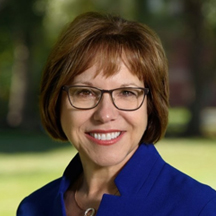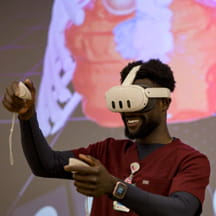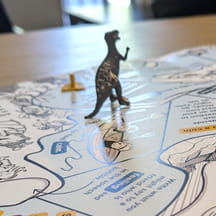In my 40 years serving as a nurse, I’ve experienced all kinds of clinical difficulties, tough workplace demands, and nearly unbearable hardships. Along the way, one thing has always kept me going: Whenever I think about the purpose of nursing practice, I think about what it looks like through the eyes of the patient.
Diagnosed with juvenile rheumatoid arthritis (JRA) at 18 months, I have spent more of my life as a patient than as a nurse. By the time I was 20, I had over 25 surgeries. I’ve lost sight in one eye and lost enough blood giving birth that I nearly died. I’ve sat bedside with a loved one with 5.0 hemoglobin, uncertain of his fate.
We know the difference we can make in a patient’s life—I know the difference they’ve made in mine. It’s an amazing opportunity to be a part of their lives. Seeing the sufferings of others is not a curse of our profession; it’s a blessing. From my lifelong journey in and out of hospitals, five lessons have stuck with me and help ground me in this purpose.
1. Taking time to talk can make all the difference
As a pediatric patient, before the Joint Commission ever told us it was important to talk to the families, I knew it was important that you talked to my mom. With JRA, I spent weeks at a time boarding at the closest children’s hospital 75 miles from my home. My mother, who raised me and my brother alone, could only drive those 75 miles once during the week and on the weekend. The question she always asked when she arrived was, “Who’s your nurse?” It made a huge difference to have nurses who took time to talk to my mom and explain to her how I was doing.
2. Genuine gestures go a long way
When I was 8 years old, I stayed for nine weeks at a hospital four hours away from my home. Through the consent for admission, the hospital performed surgery on me without my mom knowing. The recovery room nurse noticed my mother lived far away, so she wrote a letter updating her about the surgery. The nurse never found out how meaningful that letter was, but I will never forget. I know how important it was to my mom because I heard her tell that story for years—and when she passed away, I found the letter.
3. Some patients want to get personal
Sometimes in our practice, rightfully so, we hesitate to tell people our names or anything about our families. But as an adolescent patient I spent most of my summers in a surgical ward, and I remembered the nursing staff sharing about themselves and their families—even small things like the birthday party they had the weekend before. It was very comforting. I often lived those experiences through them. I’m thankful they were free enough to share that with me, so I knew what a normal childhood looked like.
4. Empathy matters
Of all my surgery experiences, nothing was as painful as orthopedic recovery. In my late teens, I had two inches taken from my femur, and the rod pulled the femur apart instead of fusing it. The surgeon had me stand on it several times to get an approximation. All of this occurred without pain medicine.
Then when I was 34, I had a knee joint replacement—not a normal knee but a fragile rheumatoid joint with very thin bones. I had forgotten about orthopedic pain. But my nurse understood. She looked at me and told me she knew the pain was not controlled. Before leaving to track down a doctor for pain meds, she assured me she would be right back. She assured me she wouldn’t neglect my pain. All those years that I was a critical care nurse, I had never thought to do that, I had never known how comforting that was for the patient.
5. All nurses provide critical care
When I started as an adult critical care nurse, we thought of ourselves as goddesses. I knew there was a unit in the hospital that took care of mothers and babies, and I thought their work was probably a little easier than mine. Little did I know how wrong I was.
After giving birth to my first-born child, I had a sudden post-partum hemorrhage, losing several pints of blood. I learned that day that critical care nursing happens in every department of the hospital, not just in a critical care unit. I wouldn’t be alive today if it wasn’t for those mother-baby nurses.
All my experiences as a patient remind me of my purpose as a nurse and why I never quit. We can make a difference in the lives of others every day by what we do.



